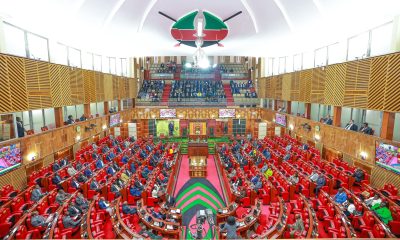Politics
LSK Rejects Crucial Finance Bill 2025 Clause Allowing KRA To Access Kenyans’ Bank Accounts
The legal body, alongside KPMG East Africa, Ernst & Young, and CDH Law Firm, has raised serious concerns about clauses that they argue fundamentally undermine individual privacy rights and due process protections for Kenyan taxpayers.

Legal and audit professionals unite against controversial tax authority powers
The Law Society of Kenya (LSK) has joined forces with major audit firms to strongly oppose contentious provisions in the Finance Bill 2025 that would grant the Kenya Revenue Authority (KRA) unprecedented access to taxpayers’ personal financial information and trade secrets.
The legal body, alongside KPMG East Africa, Ernst & Young, and CDH Law Firm, has raised serious concerns about clauses that they argue fundamentally undermine individual privacy rights and due process protections for Kenyan taxpayers.
At the heart of the controversy is a provision that would allow KRA automatic access to taxpayers’ confidential financial data and trade secrets, even while tax appeals are still pending in court.
This represents a significant departure from current practice, where such access typically requires judicial oversight or completion of legal proceedings.
The LSK and audit firms argue that this clause violates fundamental principles of due process, as it would allow the tax authority to access sensitive information before taxpayers have exhausted their legal remedies through the appeals process.
“This move undermines due process and taxpayers’ rights to fair adjudication,” the legal professionals stated in their submissions to the National Assembly Finance Committee.
Spousal Liability Clause
Another provision drawing unanimous rejection seeks to make spouses of tax defaulters personally liable for outstanding tax debts.
The LSK has described this proposal as fundamentally unfair, emphasizing that individual financial responsibility should not extend to family members who were not party to the original tax obligations.
“Someone seeking credit facilitation and defaults is a personal venture,” the LSK emphasized, warning that holding spouses accountable for another person’s tax obligations could have serious social implications and disrupt family structures.
The proposed Finance Bill also includes Clause 50b, which would extend the timeline for processing tax overpayment claims from the current 90 days to 120 days for initial claims, and from 120 days to 180 days for reviews.
Critics warn that these extended timelines could severely impact taxpayers’ cash flow and potentially destabilize the broader economy by delaying refunds that businesses and individuals rely on for operational expenses.
Legal professionals have also challenged provisions that would allow the KRA Commissioner to issue agency notices during ongoing appeals.
This power, they argue, would effectively erode taxpayers’ protections and disrupt established legal processes designed to ensure fair treatment.
The ability to issue such notices while appeals are active could pressure taxpayers to settle disputes prematurely rather than pursue their legal rights through the courts.
Housing Incentive Removal
Beyond privacy and liability issues, the LSK has opposed the proposed removal of a 15 percent income tax rebate for companies constructing at least 100 residential units annually.
This incentive, introduced in 2017 to encourage affordable housing development, has been credited with attracting significant investment to the sector.
The legal society warns that removing this rebate could discourage both local and foreign investors, potentially slowing growth in Kenya’s housing sector at a time when affordable housing remains a national priority.
National Assembly Finance Committee Chairman Kuria Kimani has acknowledged the concerns raised by the legal and audit professionals, stating that “We will consider your views as stated.” However, the committee has not indicated whether it will modify or remove the controversial clauses.
The controversy comes as Kenya faces significant challenges in tax collection, with uncollected taxes ballooning to Sh2.3 trillion as the KRA continues to struggle with compliance and collection efficiency.
The authority recently concluded an amnesty programme that waived Sh158 billion in penalties for 2.9 million taxpayers.
Public hearings on the Finance Bill 2025 are ongoing, running alongside discussions on the Virtual Assets Providers Bill 2025, which addresses tax regulations for cryptocurrencies.
If passed in its current form, the Finance Bill 2025 would represent a significant shift in the balance of power between taxpayers and the revenue authority.
The provisions would grant KRA immediate access to personal financial data during appeals, create potential liability for spouses of tax defaulters, xtend refund processing times by 30-60 days, allow tax enforcement actions during pending appeals and remove housing development incentives.
The united opposition from Kenya’s legal and audit community signals the gravity of concerns about these provisions and their potential impact on taxpayer rights and economic stability.
As public hearings continue, the Finance Committee faces mounting pressure to reconsider these controversial clauses or risk implementing legislation that legal experts warn could undermine fundamental protections for Kenyan taxpayers.
The outcome of these deliberations will likely set important precedents for the relationship between citizens and tax authorities in Kenya, with implications extending far beyond the immediate fiscal year.
Kenya Insights allows guest blogging, if you want to be published on Kenya’s most authoritative and accurate blog, have an expose, news TIPS, story angles, human interest stories, drop us an email on [email protected] or via Telegram
-

 Business6 days ago
Business6 days agoKakuzi Investors Face Massive Loss as Land Commission Drops Bombshell Order to Surrender Quarter of Productive Estate
-

 Investigations1 week ago
Investigations1 week agoINSIDER LEAK REVEALS ROT AT KWS TOP EXECUTIVES
-

 Investigations4 days ago
Investigations4 days agoCNN Reveals Massive Killings, Secret Graves In Tanzania and Coverup By the Govt
-

 Business6 days ago
Business6 days agoBANKS BETRAYAL: How Equity Bank Allegedly Helped Thieves Loot Sh10 Million From Family’s Savings in Lightning Fast Court Scam
-

 News1 week ago
News1 week agoEXPOSED: How Tycoon Munga, State Officials, Chinese Firm Stalled A Sh3.9 Trillion Coal Treasure In Kitui
-

 News1 week ago
News1 week agoEx-Boyfriend Withdraws Explosive Petition to Remove DPP After Criminal Case Against Capital FM Boss Resurfaces
-

 Politics5 days ago
Politics5 days agoI Had Warned Raila Of Possible Fallout In The Odinga Family After His Death, Oburu Says
-

 Investigations6 days ago
Investigations6 days agoHow Ruto’s Family Profits as Kenyan Women Suffer in Saudi Arabia































